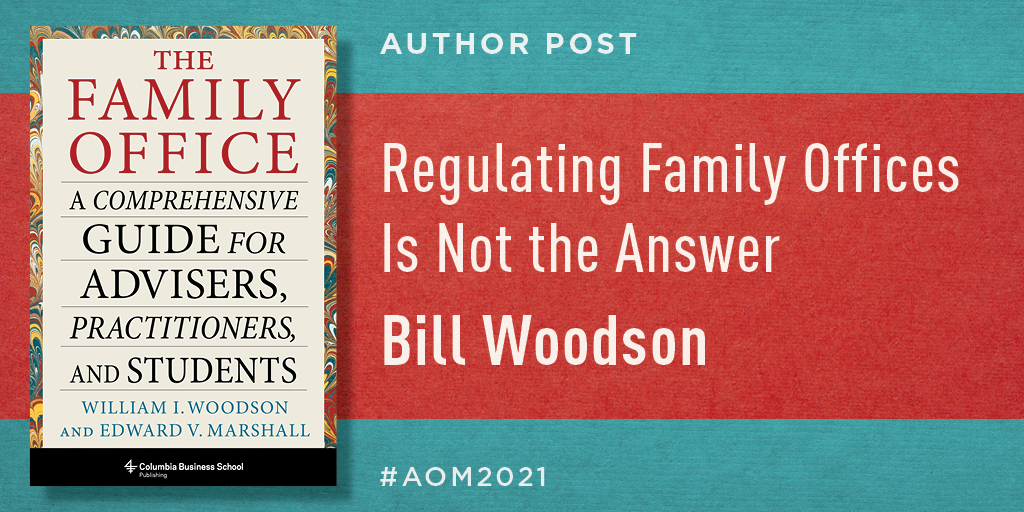Regulating Family Offices Is Not the Answer
By Bill Woodson

The recent financial collapse of Archegos Capital Management and the corresponding multi-billion-dollar losses incurred by financial services firms that extended them credit, coupled with the market disruption caused by the panic selling needed to meet margin calls, has resurfaced a debate about whether family offices should be more strictly regulated. This concern was evident in recent public comments made by Commissioner Dan Berkovitz of the Commodity Futures Trading Commission (CTFC), who stated, “The collapse of Archegos Capital Management and the billions of dollars in losses to investors and other market participants is a vivid demonstration of the havoc that errant large investment vehicles called ‘family offices’ can wreak on our financial markets.”[1]
The underpinnings of Commissioner Berkovitz’s comments relate to the CTFC’s 2019 decision to exempt family offices from having to register as commodity pool operators (CPOs) or provide annual notice to this effect. This decision was similar to one made by the Securities and Exchange Commission (SEC) in 2011 when it decided to exempt family offices from having to register as investment advisers under the Investment Advisers Act of 1940. Both regulatory agencies grant this exemption when family offices do not provide investment advice to or solicit investments from third parties (i.e., where the family office invests money solely for the benefit of family members and/or senior executives).
On May 3, 2021, the House Financial Services Committee chairwoman Maxine Waters proposed draft legislation to amend the Investment Advisers Act of 1940. This amendment would limit the exemption provided for family offices from the definition of an investment adviser to those family offices managing less than $750,000,000 in assets. It would also prevent persons who are barred or subject to final orders for conduct constituting fraud, manipulation, or deceit from being associated with a family office.[2]
The benefits of family offices as the vehicle of choice through which wealthy families manage their personal and financial affairs cannot be overstated.
The argument to regulate family offices is based on their perceived similarities to hedge funds given the amount of money they control and their ability to invest through complicated and sophisticated financial instruments. Because of this, many believe that family offices pose similar systematic risks to capital markets and their participants, including retail investors. As a result, they propose that family offices should not be exempt from registration as investment advisers simply because they do not manage money for unrelated third parties.
While understandable—in that they convey a shared disbelief and outrage that the Archegos scandal happened—the concerns expressed by regulators and members of Congress do not accurately depict family offices, the role they play in capital markets, the merits of the regulatory exemptions granted to them, or their importance to wealthy families and, by extension, society.
The benefits of family offices as the vehicle of choice through which wealthy families manage their personal and financial affairs cannot be overstated. A select few families now control a disproportionate amount of global wealth and this wealth, and how it is managed and used, has significant societal implications. Given the professional wealth-managerial function they play, family offices have an important responsibility and unique opportunity to assist families in channeling this wealth for good, whether through prudent investment management, helping children become responsible stewards of their wealth, investing in game-changing technology, or engaging in meaningful philanthropy and impact investing.
The question, then, should be how much risk private individuals should be allowed to take with their own money, or what mechanisms exist (or should exist) to monitor these exposures as they pertain to public companies.
The fact that Bill Hwang’s borrowing and investing activities were conducted through his family office should not be a factor in whether these activities should be more closely scrutinized and regulated. Family offices are simply extensions of private individuals, which, in this case, played a conduit managerial function for a private individual over his own money. Mr. Hwang could just as easily have made his large bets in his own name rather than through his wholly owned family office management company. In this case, shouldn’t the outcry be against him, the individual, instead of the entity through which he conducted his activities?
The question, then, should be how much risk private individuals should be allowed to take with their own money, or what mechanisms exist (or should exist) to monitor these exposures as they pertain to public companies. Individual investors take large bets with their own money in both private and public companies.
There are already a number of regulatory programs in place to monitor these bets in order to help investors and financial services firms avoid or mitigate any systematic risks a large investor might pose. These include SEC Schedule 13D, which must be filed once an investor acquires 5 percent or more in a public company, and SEC Section 16, which requires additional disclosures from officers, directors, and 10 percent of shareholders of public companies.
However, the culprits in this tragedy are the actors themselves, not the family office entity through which their actions were conducted.
One must also consider the role of leverage and the risk management policies of the prime brokers with which Archegos traded. These large financial services firms, which are already heavily regulated, including with respect to swap reporting and exposures, extended an enormous amount of credit to Mr. Hwang. They did so while believing that they had (1) adequate collateral, (2) appropriate risk management policies in place, and (3) sufficiently liquid positions to orderly sell shares, as needed, to meet margin calls. This, obviously, turned out not to be the case.
Congress and financial regulators are sure to focus on the actors in this tragedy, including Mr. Hwang, the prime brokers (who, according to public reporting, failed to accurately assess the total amount of leverage associated with these positions), and the swap mechanisms used to obtain high levels of credit. However, the culprits in this tragedy are the actors themselves, not the family office entity through which their actions were conducted.
William I. Woodson is the former head of a family office and ran the family office businesses for Credit Suisse and Citi Private Bank. He is also the coauthor with Edward V. Marshall, Global Head of the Family Office Group at Dentons, the world’s largest law firm, of the forthcoming book The Family Office: A Comprehensive Guide for Advisers, Practitioners, and Students.







1 Response